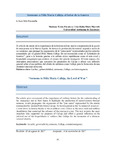
Please use this identifier to cite or link to this item:
http://ricaxcan.uaz.edu.mx/jspui/handle/20.500.11845/1073Full metadata record
| DC Field | Value | Language |
|---|---|---|
| dc.contributor | 19254 | es_ES |
| dc.contributor.other | https://orcid.org/0000-0003-3602-9115 | - |
| dc.contributor.other | 0000-0003-3602-9115 | - |
| dc.coverage.spatial | México | es_ES |
| dc.creator | Terán Fuentes, Mariana | - |
| dc.creator | Muro Marrufo, Cruz Dalia | - |
| dc.date.accessioned | 2019-09-04T18:08:45Z | - |
| dc.date.available | 2019-09-04T18:08:45Z | - |
| dc.date.issued | 2018 | - |
| dc.identifier | info:eu-repo/semantics/publishedVersion | es_ES |
| dc.identifier.issn | 2382-4794 | es_ES |
| dc.identifier.issn | 1657-3633 | es_ES |
| dc.identifier.uri | http://ricaxcan.uaz.edu.mx/jspui/handle/20.500.11845/1073 | - |
| dc.identifier.uri | https://doi.org/10.48779/9scm-9r54 | - |
| dc.description | The article gives an account of the importance of military history for the understanding of the insurgency war in New Spain. It highlights the production of sacred oratory through sermons, which propagated the arguments of the "just cause" represented by the armies commanded by General Felix Maria Calleja. To be recognized as the "Liberator of America", it went down in history thanks to the republican civic culture as the most cruel and ruthless bloodthirsty that contained the advance of the insurgent army. The text reviews the main preachers who supported the purposes of Calleja and offers a general reflection on the political use of the forgetfulness of soldiers like Calleja for the formation of a Mexican national identity. | es_ES |
| dc.description.abstract | El artículo da cuenta de la importancia de la historia militar para la comprensión de la guerra de insurgencia en la Nueva España. Se destaca la producción de oratoria sagrada a través de los sermones, que propagó los argumentos de la “causa justa” representados por los ejércitos comandados por el general Félix María Calleja. De ser reconocido como el “Libertador de América”, pasó a la historia gracias a la cultura cívica republicana como el más cruel y despiadado sanguinario que contuvo el avance del ejército insurgente. El texto repasa a los principales predicadores que apoyaron los propósitos de Calleja y ofrece una reflexión general sobre el uso político del olvido de militares como Calleja para la formación de una identidad nacional mexicana. | es_ES |
| dc.language.iso | spa | es_ES |
| dc.publisher | Universidad de Cartagena | es_ES |
| dc.relation | https://revistas.unicartagena.edu.co/index.php/eltallerdelahistoria/article/view/2220 | es_ES |
| dc.relation.uri | generalPublic | es_ES |
| dc.rights | Atribución-NoComercial-CompartirIgual 3.0 Estados Unidos de América | * |
| dc.rights.uri | http://creativecommons.org/licenses/by-nc-sa/3.0/us/ | * |
| dc.source | El Taller de Historia, Vol. 10, No. 10, 2018, pp. 41-67 | es_ES |
| dc.subject.classification | HUMANIDADES Y CIENCIAS DE LA CONDUCTA [4] | es_ES |
| dc.subject.other | Loyalty | es_ES |
| dc.subject.other | Lealtad | es_ES |
| dc.subject.other | gobernabilidad | es_ES |
| dc.subject.other | sermones | es_ES |
| dc.subject.other | Calleja | es_ES |
| dc.subject.other | contrainsurgencia | es_ES |
| dc.subject.other | counterinsurgency | es_ES |
| dc.subject.other | governability | es_ES |
| dc.title | Sermones a Félix María Calleja, el Señor de la Guerra | es_ES |
| dc.type | info:eu-repo/semantics/article | es_ES |
| Appears in Collections: | *Documentos Académicos*-- UA Historia | |
Files in This Item:
| File | Description | Size | Format | |
|---|---|---|---|---|
| Semones a Felix Maria Calleja.pdf | 267,28 kB | Adobe PDF |  View/Open |
This item is licensed under a Creative Commons License
